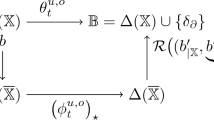Abstract
In classical deterministic planning, solutions to planning tasks are simply sequences of actions, but that is not sufficient for contingent plans in non-deterministic environments. Contingent plans are often expressed through policies that map states to actions. An alternative is to specify contingent plans as programs, e.g. in the syntax of Propositional Dynamic Logic (PDL). PDL is a logic for reasoning about programs with sequential composition, test and non-deterministic choice. However, as we show in the paper, none of the existing PDL modalities directly captures the notion of a solution to a planning task under non-determinism. We add a new modality to star-free PDL correctly capturing this notion. We prove the appropriateness of the new modality by showing how to translate back and forth between policies and PDL programs under the new modality. More precisely, we show how a policy solution to a planning task gives rise to a program solution expressed via the new modality, and vice versa. We also provide an axiomatisation of our PDL extension through reduction axioms into standard star-free PDL.
Access this chapter
Tax calculation will be finalised at checkout
Purchases are for personal use only
Similar content being viewed by others
References
Andersen, M.B., Bolander, T., Jensen, M.H.: Conditional epistemic planning. In: del Cerro, L.F., Herzig, A., Mengin, J. (eds.) JELIA 2012. LNCS (LNAI), vol. 7519, pp. 94–106. Springer, Heidelberg (2012). https://doi.org/10.1007/978-3-642-33353-8_8
Bolander, T., Engesser, T., Mattmüller, R., Nebel, B.: Better eager than lazy? How agent types impact the successfulness of implicit coordination. In: Proceedings of the 16th International Conference on Principles of Knowledge Representation and Reasoning (KR 2018). AAAI Press (2018)
Chellas, B.F.: Modal Logic: An Introduction. Cambridge University Press, Cambridge (1980)
Cimatti, A., Pistore, M., Roveri, M., Traverso, P.: Weak, strong, and strong cyclic planning via symbolic model checking. Artif. Intell. 147(1–2), 35–84 (2003)
Engesser, T., Bolander, T., Mattmüller, R., Nebel, B.: Cooperative epistemic multi-agent planning for implicit coordination. In: Ghosh, S., Ramanujam, R. (eds.) Proceedings of the Ninth Workshop on Methods for Modalities, M4M. EPTCS, vol. 243, pp. 75–90 (2017)
Gabbay, D., Kurucz, A., Wolter, F., Zakharyaschev, M.: Many-Dimensional Modal Logics: Theory and Applications, Studies in Logic and the Foundations of Mathematics, vol. 148. Elsevier (2003)
Goré, R., Widmann, F.: An optimal on-the-fly tableau-based decision procedure for PDL-satisfiability. In: Schmidt, R.A. (ed.) CADE 2009. LNCS (LNAI), vol. 5663, pp. 437–452. Springer, Heidelberg (2009). https://doi.org/10.1007/978-3-642-02959-2_32
Harel, D.: Dynamic logic. In: Gabbay, D.M., Günthner, F. (eds.) Handbook of Philosophical Logic, vol. II, pp. 497–604. D. Reidel, Dordrecht (1984)
Harel, D., Kozen, D., Tiuryn, J.: Dynamic Logic. MIT Press, Cambridge (2000)
Hustadt, U., Schmidt, R.A.: A comparison of solvers for propositional dynamic logic. In: Schmidt, R.A., Schulz, S., Konev, B. (eds.) Proceedings of the 2nd Workshop on Practical Aspects of Automated Reasoning, PAAR-2010, Edinburgh, Scotland, UK, 14 July 2010. EPiC Series in Computing, vol. 9, pp. 63–73. EasyChair (2010)
Li, Y.: Knowing What to Do: A Logical Approach to Planning and Knowing How. Ph.D. thesis, University of Groningen (2017)
Yu, Q., Li, Y., Wang, Y.: More for free: a dynamic epistemic framework for conformant planning over transition systems. J. Logic Comput. 27, 2383–2410 (2017)
Author information
Authors and Affiliations
Corresponding author
Editor information
Editors and Affiliations
Rights and permissions
Copyright information
© 2019 Springer Nature Switzerland AG
About this paper
Cite this paper
Bolander, T., Engesser, T., Herzig, A., Mattmüller, R., Nebel, B. (2019). The Dynamic Logic of Policies and Contingent Planning. In: Calimeri, F., Leone, N., Manna, M. (eds) Logics in Artificial Intelligence. JELIA 2019. Lecture Notes in Computer Science(), vol 11468. Springer, Cham. https://doi.org/10.1007/978-3-030-19570-0_43
Download citation
DOI: https://doi.org/10.1007/978-3-030-19570-0_43
Published:
Publisher Name: Springer, Cham
Print ISBN: 978-3-030-19569-4
Online ISBN: 978-3-030-19570-0
eBook Packages: Computer ScienceComputer Science (R0)




